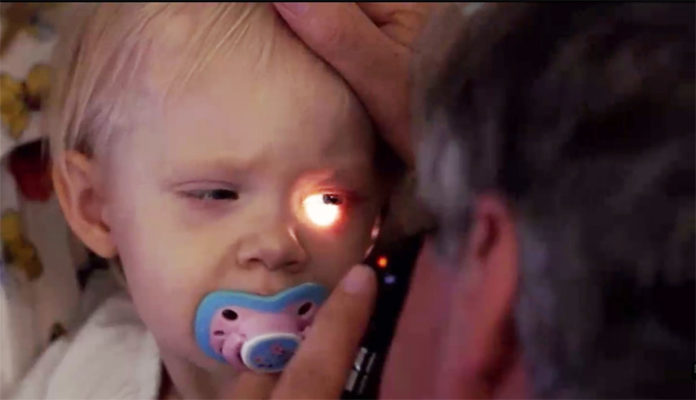Now available on Netflix, 2018 documentary “Weed the People,” follows the stories of several young cancer patients—Sophie, Cecilia, AJ, and Chico, who ranged in age from nine months to teens—and whose parents opted for cannabis oil treatment, in addition to chemotherapy. Unapologetically pro-cannabis medicine, the documentary recounts the complex insanity surrounding U.S. cannabis regulation—but especially if you’re a kid with cancer.
Because if your young child had a rare, incurable cancer and you found out that a plant-derived medication might give them improved quality of life—or theoretically, treat the cancer by somehow encouraging tumor shrinkage resulting in survival rates years beyond a grim, but average prognosis—you’d do anything you could to get that medicine for your kid.
That’s exactly what the parents in “Weed the People” have had to do, and it doesn’t make much sense. One hundred years from now, when they’ve cured cancer, they’ll laugh at the way we acted toward a plant, primarily due to a near eighty-year old political campaign against “narcotics.”
Ironically, elephant-tranquilizing opiates (also plant-derived) are available by prescription for pain relief, and are sometimes needed. But marijuana has been classified by the Drug Enforcement Agency as having “no medicinal use.” Cocaine doesn’t even qualify for a Schedule I status because of its use in some dental and medical procedures.
Cannabis experts and advocates, healthcare professionals, and officials directly address all these points and much more in the film; their arguments are very effective, but maybe not as effective as watching footage of the families as they struggle to navigate the grey area in-between traditional cancer treatment and cannabis, in a literal race against the aggressive disease.
A special online screening of “Weed the People” was sponsored by CBD product company CaniBrands and presented by women’s cannabis wellness network Ellementa, last week.
Executive produced by actress and talk show host Ricki Lake and directed by Abby Epstein, the film highlights hurdles standing in the way of those seeking cannabis oil treatment. Hurdles like U.S. federal prohibition, lack of information for healthcare professionals, stigma around cannabis use, availability of medicinal cannabis oils, finding practitioners that manufacture quality oils, the cost of treatment, lack of information on dosing, product quality control issues, and more.
Ellementa Chief Executive Officer Aliza Sherman hosted the digital screening, which was followed by special footage featuring the story of pancreatic cancer survivor and founder of NYC Botanics Jill Fagan. After the film short, audience members were treated to a panel discussion with Sherman, Lake, and Fagan. The Zoom.com platform allowed audience members from all over the U.S. to watch the film and text-chat throughout the event. Several cannabis nurse practitioners from three or four states expressed support in the chat.
The documentary features some pioneers in the “Wild West” of cannabis medicine research for cancer, including interviews with esteemed Israeli biochemist Dr. Raphael Mecholaum, who discovered THC (psychoactive cannabinoid tetrahydrocannabinol) in the ‘70s, which was followed by the discovery of the Endocannabinoid System. Also, Dr. Bonnie Goldstein, a California-based pediatrician that recommends cannabis oil for children with serious illnesses, among several other cannabis educators.
The parents in the film become virtual biochemists in pursuit of trying to find help for their families, like self-styled cannabis researcher Mara Gordon, who turned to formulating homemade oils, which eventually grew into medical cannabis oil producer Aunt Zelda’s. The patients in the film are treated with Aunt Zelda’s oils, with seemingly rapid and genuine improvement to their conditions.
That includes Sophie Ryan, who was diagnosed with an optic nerve glioma tumor at less than one-year of age. The film takes viewers from diagnosis through Sophie’s first two years of chemotherapy. Her mother Tracy Ryan has since become a pediatric cannabis advocate and founded CannaKids.com, which produces medical cannabis oil and helps parents and their children with serious illnesses, like cancer, epilepsy, and autism.
I have interviewed Tracy Ryan several times and will vouch that she has been around the world to find help for her daughter’s, and other children’s, cases. Sophie, who initially received a hopeless prognosis as an infant, now must be nearly six-years old. In fact, she was with her mother at a mid-May screening of “Weed the People” in Washington D.C., for the Congressional Cannabis Day Forum.
NYC Botanics founder Fagan was also a patient before becoming a medical cannabis oil producer and entrepreneur. Suffering from neuroendocrine pancreatic cancer, the same diagnosis that proved fatal for Apple founder Steve Jobs, the extra footage screened at the Ellementa event showed Fagan formulating her own cannabis meds in her Brooklyn kitchen and documented her experience.
A frank discussion followed the film short, where single mother Fagan explained that in her case, she had experienced tumor shrinkage–something her doctors at Sloan-Kettering Cancer Center can’t explain to her. At her next scan, she hoped for even more miraculous results.
During the chat, Lake also commented about the prior Congressional showing of “Weed the People,” and said it was very well received by attendees, though she’d hoped for a bigger crowd.
“It’s a start,” said Lake.
(This post was updated to corrected to give correct name, “optic nerve glioma.”)








